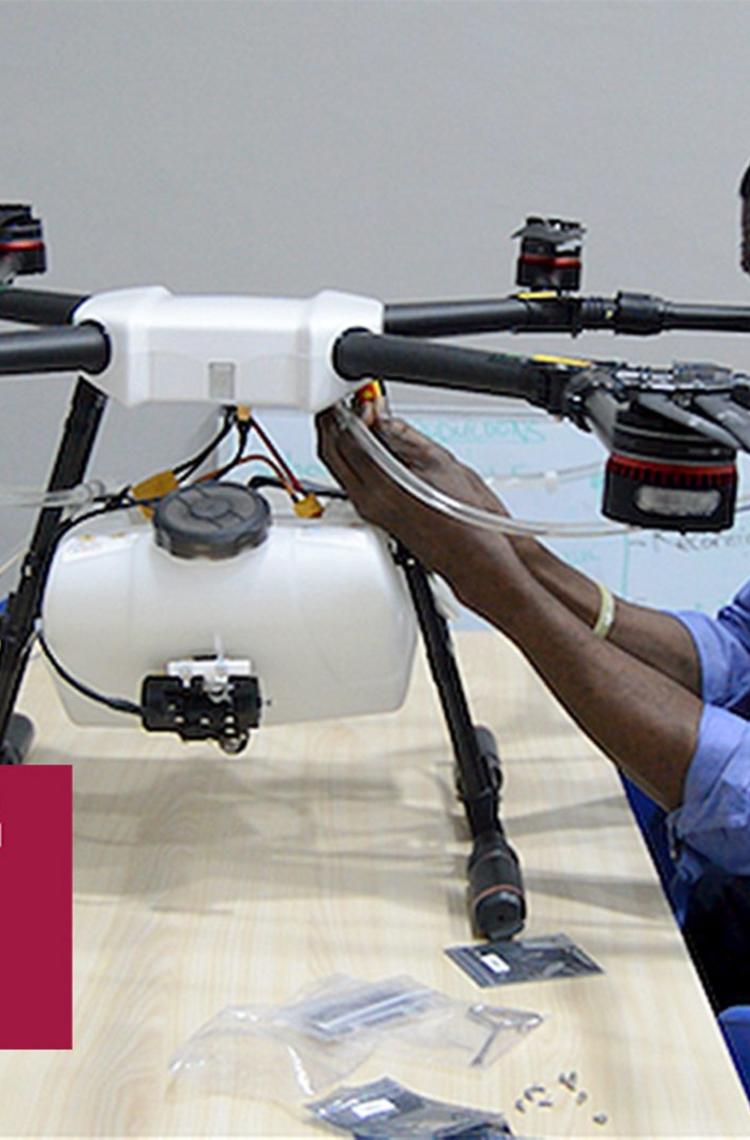The kind of advanced drone-based technology that companies like Lagos, Nigeria-based Aerial Industries are injecting into Africa’s agricultural sector could impact food production and improve lives. Their endeavours are being supported by Airbus.
This is what should bring my son back
Baba Dayo
Baba Dayo is a cassava plant farmer around the Ogunpa area in Ibadan, Nigeria. This rusty-coloured root is a staple food in a country which also produces large quantities of rice, corn and yam. But despite being the world’s largest producer, Nigeria’s cassava output stands at 10.6 tonnes per hectare, far below potential yields of more than 30 tonnes. Chronic underdevelopment has stalled agricultural production and food insecurity is on the rise. Reflecting this situation, Baba’s son left the farm years ago to become an engineer, but now his father believes technology could bring him back.
Baba’s farm was one of the 7 small-scale Nigerian farms where demonstration flights for Aerial Industries’ unmanned agricultural drones took place in 2016-17. Lagos-based start-up Aerial Industries – which is supported by business accelerator Airbus BizLab – was part of a call for innovative social ideas launched by the BizLab in coordination with the Airbus Foundation. The aim: exploring how aerospace can contribute to the UN Sustainable Development Goals.
The potential of smart farming
“The drones have a dual capability,” explains Aerial Industries’ CEO Ndubisi Arinze Eze. “They do the crop dusting and provide information about the farm through multispectral cameras and sensors. They can quickly capture the data that allows agronomists to evaluate the crops’ health and soil nutrient values.” The data can also later be used by insurance companies, banks, creditors and international bodies like the UN’s World Food Programme and Food and Agriculture Organisation.
With only around 40% of available arable land being cultivated in Nigeria, the potential for smart farming techniques is huge. “Africa is known for its intensive farming and land degradation worsens every year. Tractors are still needed for clearing the soil and for harvesting at the end. But everything in between could be done with drones,” says Arinze Eze.
Improving health, impacting lives for good
The test phase results have convinced Arinze Eze of the success of his company’s project. “We have not only been able to improve yields by 7% but also the health of the farmers.” Overexposure to agrochemicals and toxicity issues during agricultural work in many regions of rural Africa are often linked with increased skin diseases and respiratory problems.
“We can completely eliminate the farmers’ contact with such chemicals,” he notes. “Kehinde, a fellow farmer like Baba Dayo, got emotional during our demonstrations. He knew first-hand how damaging these chemicals are and realises how aerial crop spraying can be much healthier and more sustainable.”
Connection with Airbus BizLab and #africa4future
Aerial Industries will roll out a larger proof of concept in March 2018 across around 10,000 farms. For this phase, they will start using self-developed drones to replace the current off-the-shelf platforms. Based on US-patented technology that reduces the excessive sloshing of liquids within the freighter, the new drones are more stable and controllable. And this is where Airbus’ expertise in autonomous control systems, aerodynamics and structures can come in.
“To develop the products and services of the future, it is important to understand how local ecosystems function and build partnerships with new players to create links with local communities,” explains Rey Buckman, Airbus BizLab Platform Leader Hamburg. With a background in social entrepreneurship, Buckman is also involved in Airbus’ #africa4future programme.
We aim at unlocking the existing innovative and creative spirit in Sub-Saharan African countries that start-ups like Aerial Industries exemplify.
Susan Breton, Business Value Developer in Airbus’ Balance for Business network and founding member of the company’s Africa Community.
With Airbus BizLab’s support and its own combined aerospace experience of 40 plus years, the 10-strong team at Aerial Industries expects to build an initial batch of 35 drones. Its business model is based on a manufacturing franchise service, where each cooperative farming franchise will have a minimum of one drone, pilot, observer and maintenance crew member.
The desire to give back: building sustainable food production
But Arinze Eze’s connection with Airbus goes back much further. Born in Canada and raised in Lagos, he rarely saw an aircraft flying overhead in his childhood. “When I finally visited an airport, I saw unimaginable things: giant machines cruising the skies. I never thought I would have the opportunity to work in the industry,” he recalls. But he did. He studied civil engineering, started working at Rolls-Royce, and then moved to Airbus in Bristol, UK, where he was involved in the A330 and A340 programmes.
However in 2013, Arinze Eze decided to pursue his aim of contributing more directly to development in Africa. “I wanted to focus on people’s core needs. We still have to solve the challenge of hunger and how to build sustainable food production,” he says. Four years later, he is confident his company can “increase crop yield by 40%”, while the agro-drones have the potential to impact over 9,000 farmers in Nigeria within the first year, as well as 66,000 hectares of farmland in Africa and other emerging economies by the second year and 128,000 by the third.
